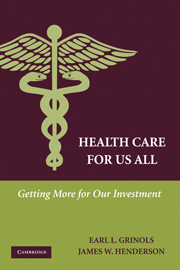Book contents
- Frontmatter
- Contents
- List of Tables
- List of Figures
- Preface
- Acknowledgments
- Executive Summary of the Targeted Intervention Plan
- PART I GOALS AND WORKING PRINCIPLES
- PART II BACKGROUND ECONOMICS AND ETHICS
- PART III APPLICATION
- 6 Why Government in Health Care?
- 7 Insurance
- 8 The Targeted Intervention Plan
- PART IV PROTECTIVE MEASURES
- A Top Ten Goals for the American Health Care System
- B Badly Done Insurance Programs Can be Worse Than No Insurance
- C Incentive Symmetry and Intervention Principle
- D Plan Workability
- E Market Power Response to Insurance
- Glossary and Definitions
- References
- Index
6 - Why Government in Health Care?
Published online by Cambridge University Press: 05 June 2012
- Frontmatter
- Contents
- List of Tables
- List of Figures
- Preface
- Acknowledgments
- Executive Summary of the Targeted Intervention Plan
- PART I GOALS AND WORKING PRINCIPLES
- PART II BACKGROUND ECONOMICS AND ETHICS
- PART III APPLICATION
- 6 Why Government in Health Care?
- 7 Insurance
- 8 The Targeted Intervention Plan
- PART IV PROTECTIVE MEASURES
- A Top Ten Goals for the American Health Care System
- B Badly Done Insurance Programs Can be Worse Than No Insurance
- C Incentive Symmetry and Intervention Principle
- D Plan Workability
- E Market Power Response to Insurance
- Glossary and Definitions
- References
- Index
Summary
All around, there will be a big push for more government involvement in the health sector, which we believe is the source of many of the problems in the health sector today.
Grace-Marie Turner, President, Galen Institute, 2006Summary: This chapter concludes the necessary examination of the foundation for provision of health care. Conventional economics does not provide a rationale for public provision of private goods such as health care and education. Modern moral pluralism, likewise, fails to provide guidance about the ethical duty of government in such cases. An appeal to externalities and help for the poor do not themselves justify the public provision of either. If there is a rationale for government attention to the issue, it derives from an oversight function related to provision for equipping the capable needy with the means of independent survival in a hostile world and provision for the incapable needy through true social insurance.
To think critically, we must think both abstractly and concretely. If we do, we are often led to conclusions and understandings that surprise and challenge our original point of view.
This chapter concludes our study of the rationale for government to have an interest in guaranteeing access to health insurance. As noted already, health care and health insurance are private goods, the benefits of which, as with an automobile, a home, or life insurance, accrue to the purchaser. Health services certainly have the property of being rival in consumption: when I occupy the operating table for my surgery, another cannot simultaneously occupy the same table.
As already noted, experience with the spread of infectious diseases suggests that preventive health care does include elements of “neighborhood benefits” or externalities.
- Type
- Chapter
- Information
- Health Care for Us AllGetting More for Our Investment, pp. 91 - 108Publisher: Cambridge University PressPrint publication year: 2009

